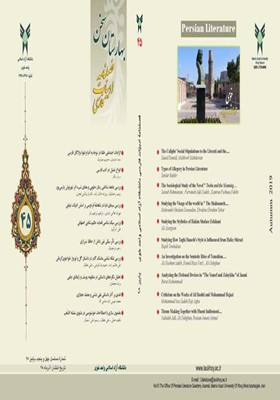Criticism on the Works of Ali Dashti and Mohammad Hejazi
Subject Areas : Abstract ArticlesMohammad Issa Zadeh Haji Agha 1 *
1 - Department of Persian Language and Literature, Bostan Abad Branch, Islamic Azad University, Bostanabad, Iran.
Keywords: story, Keywords: court literature, Ali Dashti, Mohammad Hejazi,
Abstract :
Abstract From the view point of the promulgation or limitations of Persian Literature, especially in story-writing field, the years 1320 – 1300 are of thorough significance. The liberal forces who considered themselves the winners of constitution revolution, wished that the victory process and social structure be continued. But in front of them there were new powers that wanted to strengthen its bases. Struggling to attain power which existed in all ranks of society, had influence on the literature, too. The liberalists wanted to unmask the reality to the ordinary people; and the newly founded Pahlavi power wanted, by eliminating the impediment and suppressing the opposition, to legitimize its monarchy in the view of people. Both sides had understood the importance of literature, especially story-writing, and wanted to take benefits of its impact to develop their desires. Consequently, two types of literature and story-writing , with different purposes, were developed in Iranian society which can be called : court and folk literature. Senator Ali Dashti and Senator Motioddowleh Mohammad Hejazi were the leading figures of court literature and their only purposes were to entertain people and lead their minds to other problems including extravagant love and unbridled self-indulgence to divert people's attention from social problems. The stories of these two court writers, in this article, have thematically been investigated to show which of the problems were of importance in their ideas.
فهرست منابع و مآخذ
1- آرینپور، یحیی، (1374)، از نیما تا روزگار ما، تهران: زوّار، چاپ اوّل.
2- استعلامی، محمّد، (2535)، ادبیّات دوره بیداری و معاصر، تهران: دانشگاه، چاپ اوّل.
3- حجازی، محمّد، (1341)، ساغر، تهران: نیلوفر، چاپ یازدهم.
4- _________ ، (1345)، زیبا، تهران: ابنسینا، چاپ نهم.
5- _________ ، (1352)، مجموعه آثار محمّد حجازی، تهران: امین، چاپ دوّم.
6- خشکباری، حسین، (1381)، داستان کوتاه در ایران، تهران: ثریّا، چاپ اوّل.
7- دشتی، علی، (بیتا)، جادو، (الف)، بیجا.
8- ______ ، (بیتا)، فتنه، (ب)، بیجا.
9- ______ ، (بیتا)، هندو، (ج)، بیجا.
10- ذوالفقاری، حسن، (1386)، سر دلبران، تهران: مازیار، چاپ اوّل.
11- رائین، اسماعیل، (1357)، فراموش خانه و فراماسونری در ایران، تهران: امیرکبیر، چاپ پنجم.
12- ریپکا، یان، (1351)، تاریخ ادبیّات ایران. تهران: بنگاه ترجمه و نشر کتاب.

